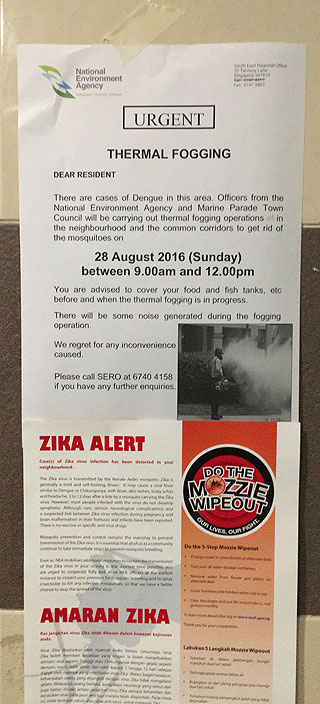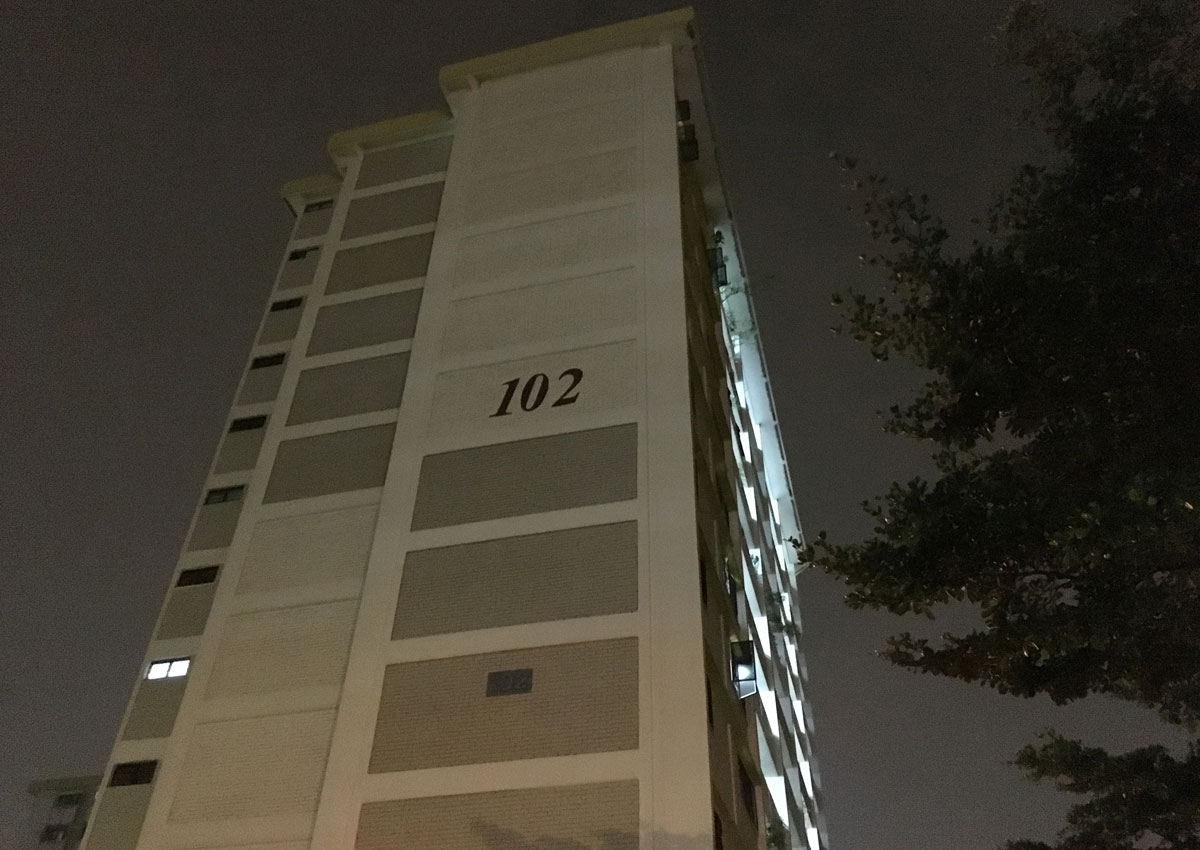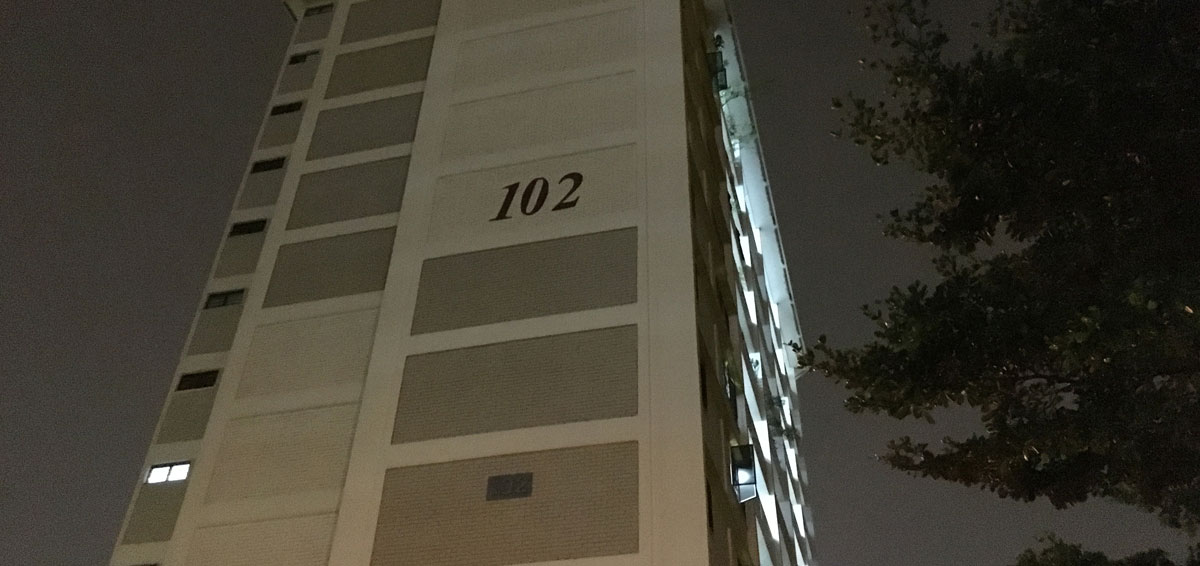The first case of locally transmitted Zika virus was reported yesterday at Block 102, Aljunied Crescent. HARIZ BAHARUDIN (harizbah@sph.com.sg) visited the block to find out how residents feel
When she found out she was pregnant five months ago, Aljunied Crescent resident Mastika Yacoob, 42, told herself she would take no chances with the dangers of dengue.
For the first three months, the designer made sure she had a mosquito patch on her at all times.
Her concerns abated in her fourth month, and she stopped wearing them.
But now, five months into her pregnancy, she is worried again.
Yesterday, news emerged of Singapore’s first case of locally transmitted Zika virus. And it was traced to her place at Block 102, Aljunied Crescent.
Speaking to The New Paper on Sunday at her home last night, Ms Mastika was visibly stunned by the news.
 With one hand on her stomach, she said: “Here? In our block? That is scary. It’s something I’ve always been fearful of.”
With one hand on her stomach, she said: “Here? In our block? That is scary. It’s something I’ve always been fearful of.”
Zika poses a serious threat to pregnant women as it can lead to their children having birth defects.
She and her husband, 36-year-old software engineer Kohodai Dada, are not taking any chances and said they would purchase more mosquito patches right away at the nearby 24-hour supermarket.
Mr Dada said: “We always hear it on the television, but now this is a different thing altogether.
“To know that someone was infected in the very block we live in, it makes the problem that much closer to home.”
According to a joint statement by the Ministry of Health (MOH) and National Environment Agency (NEA), the patient, a 47-year-old Malaysian woman, tested positive for the virus yesterday at the Communicable Diseases Centre (CDC) at Tan Tock Seng Hospital.
The unnamed woman had not travelled to Zika-affected areas recently and developed symptoms on Thursday.
The patient was referred to the CDC by a general practitioner (GP) on Friday. She is now hospitalised and is recovering.
The two agencies said with the “volume of travel by Singaporeans as well as tourists, it is inevitable that there will be imported cases of Zika into Singapore”.
There is also the “risk of subsequent local transmission”, due to the presence of the Aedes mosquito here.
FURTHER CASES
The statement said: “While MOH and NEA have stepped up precautionary measures, we expect that there may be further cases, as most infected persons may display mild or no symptoms.”
The patient’s close contacts, including household members, are being screened.
MOH is also testing others in the area who have fever and a rash. There are three other suspected cases in the area pending confirmation tests.
As an added precaution, all suspect cases of Zika virus infection will be isolated while awaiting confirmation of the blood test results.
All GPs around the 12-storey Block 102 and the patient’s workplace have been alerted to be “extra vigilant”.
Health Minister Gan Kim Yong said: “MOH and NEA are working together to carry out vector control and testing of residents in that area with fever and rashes so as to reduce the risk of further spread.
“I encourage those who are unwell and with these symptoms to visit their doctors for medical attention.
“We have also alerted our clinics in the area to look out for suspect cases and refer them to the CDC for testing.”
When TNPS visited the block last night, many residents had no idea their estate was home to Singapore’s first locally transmitted case of Zika.
Housewife Premavathi R, who is three months pregnant, was not even aware of the dangers Zika posed.
But her husband, 33-year-old IT engineer Vasanthan N, knew about it and said he was “concerned”.
After he explained the virus to her and informed her one of their neighbours was infected, she gasped.
Ms Premavathi, 28, said: “We’ve always kept the house clean, but I will consider buying insect repellent for my family and for my unborn child.”
But to Ms Mastika, there is no time to lose.
Besides the patches, her family will also be getting insect repellent which they will start using as soon as they return from the supermarket.
“I’ve lived here since I was five. This area isn’t the cleanest and people litter a lot,” she said.
Clutching her husband’s arm, she added: “There are so many breeding grounds for mosquitoes and what if they spread Zika?
“I am paranoid now.”
What is Zika?
Zika is a disease caused by a virus transmitted by the Aedes mosquito. It was first detected in Zika Forest in Uganda in 1947 in a rhesus monkey, and in the Aedes africanus mosquito in 1948.
Its incubation period is likely to be a few days and the symptoms are similar to those of other mosquito-borne diseases such as dengue and chikungunya: fever – rashes, conjunctivitis, muscle and joint pain, malaise and headache.
Zika has been linked to instances of Guillain-Barre syndrome – a rare disorder that causes muscle weakness and temporary paralysis.
It has also been linked to microcephaly, a rare condition in which babies are born with abnormally small heads.
There are currently no vaccines or drugs for Zika, as the disease was rare and mild until last year.
Those infected are usually advised by doctors to get plenty of rest and drink lots of fluids, while pain and fever are treated with available medicines.
Sources: World Health Organisation, Centres for Disease Control and Prevention
OLYMPICS TEAM
Yesterday, the Singapore National Olympic Council sent out a statement saying that the 25-member team of athletes and officials who represented Singapore at the recent Rio Olympics were not affected by the Zika virus.
“The athletes and officials of the Rio 2016 Olympic Games Team Singapore contingent have returned to Singapore safe and symptom-free from Zika,” said Mr Low Teo Ping, chef de mission for Team Singapore.
“We are keeping a close tab on the athletes and officials, monitoring them for symptoms such as fever, skin rash, headache, fatigue, muscle pain, and joint pain for three weeks upon their return.
“We have also advised them to continue to apply insect repellent and wear long-sleeved clothing where possible and to avoid travel to multiple places in a day.
“Any occurrence and non-occurrence of symptoms are updated to the team doctor daily.”

This article was first published on Aug 28, 2016.
Get The New Paper for more stories.







